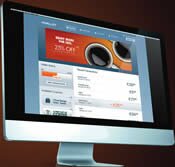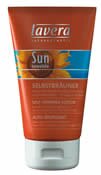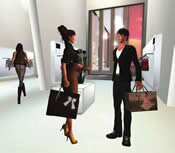Inflight Magazine of Brussels Airlines
Welcome to the Inflight Magazine of Brussels Airlines
Business trends
Image photolibrary.com Rex Features, Reuters
Boyd Farrow rounds up what’s happening in the business world across Europe
 Meat and greet
Meat and greet
Germany hosts first kebab trade fair
Considering that there are now hundreds more döner kebab stands in Berlin than in Istanbul (the business is worth €2.5bn annually), and that Germany is the world’s leading trade-fair country, it’s amazing it hasn’t happened sooner: the German döner industry has just held its first ever trade fair. It attracted the elite of the Berlin business, with exhibitors ranging from those at the ‘cutting edge’ of kebab technology and kitchen uniforms to kebab spice sellers, while Renault and Mercedes were also present to talk up their cold-storage vehicles.
Among the issues discussed were the cost of a döner kebab and whether lower prices could sustain a small business, a standards system for quality control, and vocational courses for kebab workers – given that it’s hard for those not of Turkish extraction to enter the trade. Though well attended, the show’s biggest star wasn’t Remzi Kaplan – millionaire head of Kap-Lan Döner Production, the largest kebab maker in the EU – but a remote-controlled ‘döner robot’, which has a digital camera to guide a blade down the spit of meat. Curiously, the person behind this mechanical wonder isn’t Turkish or German, but a Cypriot-born Viennese entrepreneur. Nevertheless, Ahmet Kalyoncu hopes to sell his Döner Robotu machines to some of the estimated 15,500 kebab businesses all over Germany. Even more surprising was the fact that convention-goers weren’t eating their beloved products: the official menu was meat patties, boiled vegetables and cheesecake.
 Rise of the machine
Rise of the machine
Nespresso is Nestlé’s greatest success story
Many people regard the Nespresso machine – a cross between a coffee maker and a stun gun for cattle – as the trouser press of the last decade; it’s often in your hotel room, but you’re never quite sure how to make it work. Clearly not everyone feels this way, however, as Nestlé Nespresso has become the fastest growing unit within the Swiss food giant’s empire for the fourth consecutive year. The coffee capsule system delivered sales of €1.94bn/CHF 2.77bn in 2009, up by more than 22%, while the company also grew its retail network to more than 190 boutiques and launched CitiZ, a new machine range.
In 2010, Nestlé says it’s on track to deliver double-digit growth and pass the €2.1bn/CHF 3bn sales milestone. CEO of Nestlé Nespresso Richard Girardot says that this will be achieved partly by expanding Nespresso’s global retail network, adding more than 30 locations. There’ll be flagship boutiques in Brussels, Munich, Miami and New York, as well as the first Nespresso locations in Sub-Saharan Africa. Girardot states Nespresso will roll out a new customer service model, “starting by renewing the sensory and brand experience in our boutiques,” before launching a new ecommerce platform.
 Mobile money
Mobile money
New technology will facilitate payments via mobile phones
Two Belgian outfits specialising in mobile and micro payment systems – Clear2Pay and PingPing – have linked up with the telecoms giant Alcatel-Lucent to enable mobile operators to launch person-to-person payment, remote ticketing and mobile commerce services.
Some analysts say that the new service, thought to be the first in this category to be launched by a telecom equipment maker, could be a unifying factor in what is a highly fragmented mobile payments market. The service is based on a new kind of short-range radio called Near Field Communication (NFC). In the next few years NFC chips are expected to find their way into mobile phones, PCs, consumer electronics and industrial equipment, enabling real-world objects to connect to the internet and communicate with each other. The technology will make it possible to pay for goods and services – such as cinema tickets and public transport – by simply waving a contact-less card or mobile phone equipped with NFC in front of a cash register or turnstile. Eventually, most mobile phones will have built-in NFC cards and readers. Alcatel-Lucent is also leveraging NFC applications technology developed in-house, called touchatag, which offers mobile services such as interactive advertising, loyalty programmes and coupons.
 Online opulence
Online opulence
Luxury brand Richemont invests in the internet with Net-a-Porter
Richemont, the Geneva-based luxury goods group that owns the Cartier and Mont Blanc brands, has taken a further step into the online arena with a majority stake in Net-a-Porter – a deal that values the British luxury e-tailer at €385m. Richemont already owns 29% of Net-a-Porter, whose sales have rocketed from €90m in the year to 31 January 2009 to about €132m in the last 12 months. Net-a-Porter’s management team is hoping to be able to tap into Richemont’s expertise in the Asia-Pacific region, while Richemont executive chairman Johann Rupert is expecting to be able to use Net-a-Porter’s skill in selling luxury online to help develop his own company’s internet strategy.
Luxury websites have been doing well during the recession, allowing shoppers to get a stealthy purchasing fix and designers to discreetly offload unsold shop stock. All Richemont’s labels have virtual stores, and competition is fierce. Milan-based fashion label Alberta Ferretti has just launched an online store that will make its ready-to-wear accessories and fragrance collections – as well as those from the Philosophy collection – accessible from 52 countries in Europe, North America, Japan and the Far East.
 Domestic labour?
Domestic labour?
Immigrants make up large proportion of Russia’s workforce
As much as 10% of Russia’s workforce is made up of foreign employees, according to a new report by the United Nations. The survey of Russia’s demographic development, commissioned by the United Nations Population Fund, stated that there were 2.4m officially registered migrants in 2008 (although the real figure is likely three times higher) and that “illegal migrants are employed in jobs that the local population doesn’t want.” Russia’s official workforce stood at about 74.5m – or 52% of the population – as of February 2010, according to the State Statistics Service. The report praised authorities for better facilitating the registration procedure for migrants and improving border control, but said the country still lacked a systemic approach to immigration and that “both the workforce shortage and the risks posed by illegal migration are underestimated.”
A 2007 law regulating foreign workers required candidates to present an ID document and a migration card, and pay a fee to get a card. The law allowed migrants to obtain a work permit and change employers freely, rather than depend on a specific employer to get one, as before. But in June 2009 Vladimir Putin vowed to reverse the measure and link each migrant to an employer, so as to have more leverage on the number of foreign workers.
 Truth and beauty
Truth and beauty
Natural cosmetics organisation launches mobile service to provide facts about products
NaTrue, the Brussels-based international natural and organic cosmetics association, is upgrading its website to include information not only on the natural ingredients in products, but also about the companies who produce them, their values, environmental standards and trade practices. Part of the relaunch is the introduction of ‘quick response’ (QR) codes, allowing shoppers to access this information as they are perusing the aisles. By taking a photo of the code, your mobile phone will automatically lead you to a product-specific weblink. The mobile technology replaces NaTrue’s three-star labelling system, which only gave approximate information about the product.
“We are turning the point-of-sale into a point of experience,” says company president Moritz Aebersold, who is attempting to develop NaTrue into a modern service brand together with other founding members such as Dr.Hauschka, Lavera, Logona and Primavera. “This is an exciting development for producers, retailers and consumers alike. People want authentic products and with the QR tags, in-depth information is just a click away.”
Almost 400 products have been certified under the NaTrue label, ranging from make-up to toothpaste (visit www.natrue-label.com for more information). The new site will also feature an online community, where friends of natural and organic cosmetics can connect, in addition to the existing NaTrue presence on Facebook and Twitter.
 Divine discovery
Divine discovery
UV light reveals Giotto frescoes in Florence
Rome has its shiny new Maxxi modern art museum and Mestre – the grimy town outside Venice – is attempting to reinvent itself as a high-tech business centre, but Florence simply continues to unearth riches from its past. As part of a project to ascertain the condition of the Peruzzi Chapel in the city’s Santa Croce Church, which Giotto painted in 1320, restorers using ultraviolet rays have discovered long-lost colour and details in the frescoes.
Giotto’s work in the lance-shaped chapel is believed to have had a major influence on Michelangelo, who painted the Sistine Chapel in the early 1500s. The details that seduced Michelangelo, however, have been hidden for centuries, and are only visible when bathed in ultraviolet light – not only impractical, but also potential damaging. Florence’s Opificio delle Pietre Dure, one of the world’s most prestigious art restoration laboratories, says sharing the discovery with the general public would involve a huge and costly project to allow visitors to enjoy a virtual chapel on computer screens. In other words, Florence may find itself at the vanguard of high-tech, data-augmented reality. The laboratory hopes to find sufficient funds to have a complete ultraviolet mapping of the entire chapel, in order to build the software to show the frescoes to the world.
 Financial injection
Financial injection
European Commission provides shot in the arm for flu research
The European Commission has unveiled plans to ‘inject’ €18m into research projects on influenza, as MEPs from across the political spectrum call for a European Parliament inquiry into the handling of last year’s swine flu pandemic.
The EU executive has shortlisted four collaborative projects for funding, which involve 52 research institutes and SMEs from 18 European countries and three international partners (Israel, China and the US). These latest projects bring the total EC funding for flu research to over €100m since 2001.
Máire Geoghegan-Quinn, EU commissioner for research, innovation and science, says EU research to prevent and treat flu has “enormous social and economic value”. Two consortia will focus their research on influenza in pigs (presumably not the Israeli partners), while the two others will develop innovative drugs against influenza in humans. The EC has also announced a slightly creepy-sounding “European surveillance network” that aims to increase knowledge of the epidemiology and evolution of the swine flu virus in European pigs.
 Out-of-this-world expenditure
Out-of-this-world expenditure
Swedes anger at ‘unwanted’ local government splurges
Fed up with the way in which local councils and state agencies manage money, the Swedish Taxpayers Association has joined with think-tank Timbro to appoint an ombudsman to which citizens can report wasteful government spending. According to the inaugural taxpayer ombudsman Johan Ingerö, Sweden’s local councils may receive an extra €1.75bn/SEK 17bn to avoid making cuts in core welfare services during this year alone – but most Swedes simply don’t trust the councils with that money.
The public is furious about money being wasted on ventures – particularly involving sport and leisure – that they don’t want and can’t afford. Värmdö (a large community in Stockholm), for example, was given €25.6m/SEK 250m for a water park – which has forced a local fitness club out of business, leading to the unemployment of local residents.
What’s more, it seems government waste isn’t restricted to real world.
Ingerö also notes how angry the Swedish people are over taxes being spent on internet fads, such as the municipality of Malmö spending €123,000/SEK 1.2m creating a presence in the virtual world Second Life. At the same time, the Swedish Research Council granted researchers in Umeå €308,000/SEK 3m to study “religiosity in virtual worlds”.
Leave a Reply
